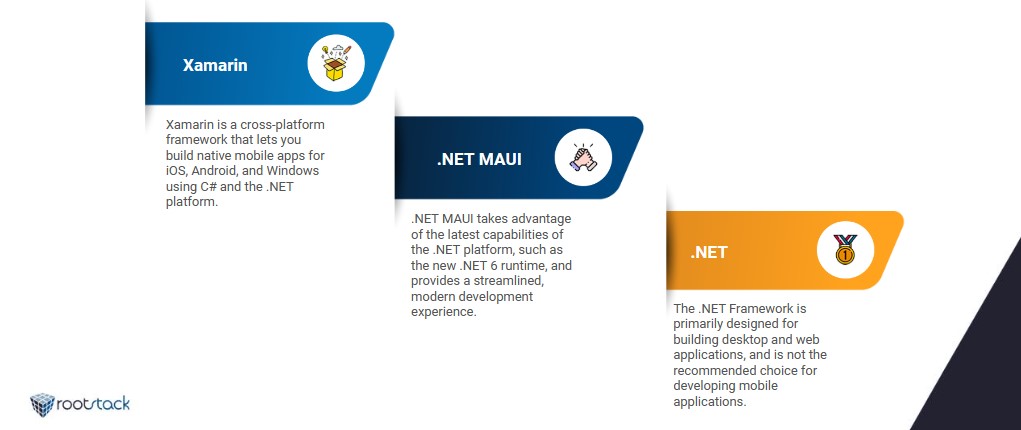Which version of the .Net framework is best for mobile apps?
May 31, 2023
Table of contents
Quick Access

Designing and developing mobile applications is a difficult task these days: they must be efficient and fulfill the needs of the user, who has more technical expertise and is more demanding with his software goods with each passing year. The Microsoft's .Net framework includes various capabilities that might assist in satisfying the user and developing the ideal mobile application.
How many versions are there of the .Net framework?
Like any technological tool, the .Net framework has gone through several versions since its creation in 2002, which is why it is considered one of the pillar technologies in the construction of web applications and web pages, being used for the first of them.
There are different versions, some with very good functions and others that are no longer used. Let's review each of them:
|
Version number |
CLR version |
Launch |
Included in Windows |
|
1.0 SP2 |
1.0 |
07-08-2002 |
XP SP1 |
|
1.1 SP1 |
1.1 |
30-08-2004 |
XP SP2 y SP3 |
|
2.0 |
2.0 |
27-10-2005 |
N/A |
|
3.0 |
2.0 |
06-11-2006 |
Vista |
|
3.5 SP1 |
2.0 |
11-08-2008 |
7 SP1 |
|
4.0 |
4 |
12-04-2010 |
N/A |
|
4.5 |
4 |
15-08-2012 |
8 |
|
4.5.1 |
4 |
17-10-2013 |
8.1 |
|
4.5.2 |
4 |
05-05-2014 |
N/A |
|
4.6 |
4 |
20-07-2015 |
10 v1507 |
|
4.6.1 |
4 |
30-11-2015 |
10 v1511 |
|
4.6.2 |
4 |
02-08-2016 |
10 v1607 |
|
4.7 |
4 |
05-04-2017 |
10 v1703 |
|
4.7.1 |
4 |
17-10-2017 |
10 v1709 |
|
4.7.2 |
4 |
30-04-2018 |
10 v1803 y 10 v1809 |
|
4.8 |
4 |
18-04-2019 |
10 v1903, 10 v1909, 10 v2004, 10 v20H2 |
|
4.8.1 |
4 |
09-08-2022 |
N/A |
|
1.0 SP2 |
1.0 |
07-08-2002 |
XP SP1 |
The best version of the .Net Framework for mobile applications
The .NET Framework is primarily designed for building desktop and web applications and is not the recommended choice for developing mobile applications. However, there are other frameworks provided by Microsoft that are more suitable for mobile app development. These are the two main options:
Xamarin
Xamarin is a cross-platform framework that allows you to build native mobile apps for iOS, Android, and Windows using C# and the .NET platform. Xamarin allows you to share code across multiple platforms, which can save development time and effort. Provides access to native APIs and UI controls, resulting in high-performance applications.
.NET MAUI (Cross Platform Application User Interface)
.NET MAUI is the evolution of Xamarin.Forms and is a user interface framework for building cross platform mobile applications. It is designed to create native user interfaces for iOS, Android, macOS, and Windows from a single code base. .NET MAUI takes advantage of the latest capabilities of the .NET platform, such as the new .NET 6 runtime, and provides a streamlined, modern development experience.

Both Xamarin and .NET MAUI are suitable for building mobile apps with .NET, but .NET MAUI is the recommended choice for new projects as it offers a more modern and robust development experience. It's worth noting that .NET MAUI is based on Xamarin.Forms and provides a smoother transition path for existing Xamarin.Forms applications.
Other uses of the .Net Framework
In addition to its contribution with other technologies for the construction of mobile applications, and its popular use for developing web and desktop applications. The .Net framework also has other perhaps little-known uses:
- Web services and APIs: The .NET Framework enables the development of web services and APIs. Using technologies like ASP.NET Web API or Windows Communication Foundation (WCF), developers can create RESTful services or SOAP-based web services to expose functionality on the web. These services can be consumed by various client applications, including web, desktop, and mobile applications.
- Database applications: The .NET Framework provides strong support for database programming. Developers can take advantage of ADO.NET, an integral part of the framework, to interact with various databases using a variety of data access technologies, such as the Entity Framework, LINQ to SQL, or raw SQL queries. This makes it easy to build data-driven apps, perform CRUD operations, and handle data synchronization.
- Game development: The .NET Framework is used in game development, especially for creating Windows games. The framework offers libraries such as Managed DirectX and XNA Framework that provide access to graphics and multimedia capabilities, allowing developers to create 2D and 3D games using managed code.
- Cloud Applications: With the advent of cloud computing, the .NET Framework has expanded its capabilities to enable the development of cloud-based applications. Microsoft Azure, Microsoft's cloud computing platform, supports .NET development and provides services such as Azure App Service, Azure Functions, and Azure SQL Database that enable developers to build scalable and resilient cloud applications.
These are just a few examples of the many uses of the .NET Framework. Its versatility and extensive ecosystem of libraries and tools make it suitable for a wide range of application development scenarios.
We recommend you on video
Related Blogs
Free Magento Commerce Features for an Online Store

How to use chatbots for e-commerce?

Which API is best for Android App Development Services

How to automate processes with Odoo software
What programming language is used with React Native?
